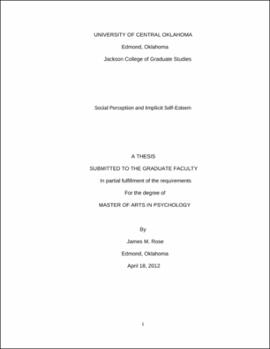| dc.description.abstract | Three experiments investigated whether implicit self-esteem was influenced by various perceptual stimuli. It was predicted that positive comments, performance, and feedback would lead to high implicit self-esteem, whereas negative comments, performance, and feedback would lead to low implicit self-esteem. In Experiment 1, participants heard a positive comment, negative comment, or no comment about their appearance and then completed the self-esteem Implicit Association Test (IAT). In Experiment 2, participants completed an easy mathematics test, hard mathematics test, or no mathematics test and then completed the self-esteem IAT. Following the mathematics test, they completed the Future Event Scale (Andersen, 1990) and Interpersonal Expectancy Scale (Mather & Mather, 2009). Finally, in Experiment 3, participants received either positive false feedback about their performance on a mathematics test, negative false feedback about their performance on a mathematics test, or no feedback and then completed the self-esteem IAT. No significant effects of condition were found for any of the experiments. The self-esteem IAT was robust to a variety of manipulations. Furthermore, the largest differences between groups came from human contact and not computer contact. The influence of people and not computers on implicit self-esteem is interpreted as being evidence for the fundamental need to belong--Abstract. | |
